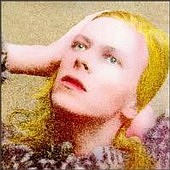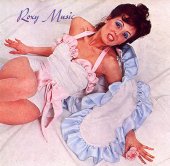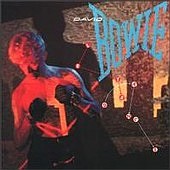ch ch ch ch Changes... | |

| Michael Stipe once said that he was proud of the fact that he did not own any records by The Beatles, and even though I had at one time put great stead in the recordings of REM, this was the thing I most identified with him over. It was in a similar pique of cultural snobbery that I once said to someone that I was proud of the fact that I did not own any records by David Bowie, but I don't think such a statement generated the same kind of response. Possibly because I was not a famous rock icon, or possibly because Bowie had been around making records long enough to have soiled his copybook. I'm not sure it matters either way. I was always suspicious of Bowie and I don't know why. I suspect it may have had something to do with the fact that he was an obvious figure of success and that in my tortured teenage angst it was all I could do to identify with the ignored and forgotten whilst hurling abuse at the famous and acknowledged. Hence being sixteen and avowing allegiance to Lou Reed and The Velvets, or Alex Chilton and Big Star, say, (of course before his critical renaissance) rather than Roxy Music and Bowie. Looking back it makes a certain nonsense to have made these distinctions of course, not least because the things you choose to imagine as the ignored and underground are in fact anything but, but that is a part of being sixteen and I would have it no other way. I wasn't young enough to have any recollection of the Glam '70s, and have very few memories of the decade that style initially forgot before post-modern irony made it clear that in point of fact, style had merely been laying foundations for future reverential reference. My memories of the 1970s are to do with Paul Weller telling Sue Lawley that he would be voting Tory and of seeing Joy Division on the telly and being scared to go out at night as a result. Which isn't quite true of course because I only ever saw Joy Division on telly in the '70s much later, in the '80s when I went out late at night because I was too scared to stay home. |

| There has been a lot of referencing of the '70s in popular culture during the past decade and most of it has been shoddy and ill-advised. A prime example would be the movie Velvet Goldmine, which I recently tried to watch but had to switch off after barely a half hour. I don't normally switch movies off. I usually see them through to the end, if only to be able to shrug and say, 'ah, it's not as good as they all say it isÉ' Velvet Goldmine though was maybe the worst movie I have ever seen. Or at least partly seen. Plotless, clueless, soulless, styleless. Less is most assuredly less. No more. It did, however, make me want to hear the proper records though, which is maybe a success, and which was maybe the whole point of the movie anyway; a cynical exercise in selling reissue CDs, and if that's the case then I fell for it hook, line and sinker. I already had the Roxy Music album. The one with 'Re-Make/Re-Model' and of course 'Virginia Plain'. I got it four years ago but I can't recall why. I barely played it in that time, but playing it now I can hear the impression that the record must have made on the punk kids that ended up making records I held dear to my heart. Or some of them at leastÉ there's a spiky charged atonality to parts of Roxy Music that I would have heard echoes of in The Pop Group (albeit echoed through a great big fuck-off metal chamber with spikes coming out of the walls, closing in with great jerks of dark threat) or in Essential Logic. But those are connections that are easy to make when you're past thirty and being all smug and referential on a Sunday afternoon sitting drinking coffee and not nearly so important when you're young, foolish and in love with the effects the music has on that part of your psyche you cannot touch. When you just know it all turns you on and you know what side of the fence you're standing and that Roxy Music are on the other side, regardless of what any music journalist might suggest. But it is Sunday afternoon, there is black coffee, and lots of it, and I am listening to Roxy Music and it does all sound rather fine. My friend Rupert suggests that another Roxy Music album, the one with the woman holding a panther on a leash or somesuch, is far superior, but I wouldn't know about that. I'm not that much of a completist and I don't even have that much interest. He suggests it is superior because apparently there is more of Brian Eno's electronic noodlings, and as we all know, it is for Eno that we all appreciate the early Roxy Music, so he must have a sound argument. Truth be told, though, I never really got into Eno much. I liked the one about looking for a certain ratio, and I liked the Music For Airports and the Apollo record because it's good to mix in as background texture to any DJ set (no DJ should be without itÉ) but that's about it to be honest. I think he's over-rated and I rate his ideas much higher than his actual music. He strikes me as an academic, and academics often lay interesting foundations that others build their own beauties upon, but they rarely make great Art themselves. |

| Eno of course collaborated with David Bowie on his Low record and it's widely regarded as a classic. James Brooks of the band Appliance says it's one of his favourite records, and it's easy to see why because it could almost be a blueprint for the Appliance sound to date, being a blend of PopRock sensibility and colourful electronic experimentation. There's also obviously the German connection through the Hansa studio in what was once West Berlin, with all the strange bohemian Cold War romantic association that carries, and although of course it's wrong to suggest that anyone with sense would wish those times back again, the world does seem strangely empty without those clearly defined edges and opposites to pull against. Low is one of two David Bowie records that I now own, and I have to say that I'm not wholly convinced by it, but then I must qualify this by telling you that I find it hard to be convinced by much these days, old or new. This is mainly to do with the fact that music really is about time and place and moment, and to be honest there's precious few moments that make much of a connection these days, and that's probably the saddest thing in the world, but there it is. I noticed that 'What in The World' has the lines 'you're just a little girl with grey eyes' and that they sound like the lines in the Pulp song 'Little Girl' which is my favourite Pulp song and which can still make me come over all strange. I'm not sure if it's unfashionable to say it these days, but I still find those early Pulp songs to be seedy, seductive beasts. 'I Want You' makes my heart crack. Hunky Dory is the other Bowie I own, and whilst it's not as 'interesting' a record as Low, it holds immeasurably more appeal for me. It's a record that used to play a lot in a strange garage club in the middle of nowhere (or the west of Scotland if you'd rather) and that my friend Scott once got cheap from Woolworths. We played it a lot in my parents' front room when we were meant to be on the school playing fields and we especially liked the line in 'Kooks' about throwing homework on the fire. Later of course we loved Morrissey for paraphrasing it in the otherwise rather shoddy 'Sheila Take A Bow' but that's another story. I always rather liked the fact that there was a song called 'Andy Warhol' and that Bowie was pretty obviously in awe of the whole Lou Reed thing, and probably imagined himself as some strange English equivalent from the suburbs. And I liked the way that the song started with some kind of studio banter about how to pronounce 'Warhol' because it was one of the things that some of us discussed in our Art class, along with how to pronounce Van Gogh. I said it as in 'Go' because that was how Wendy Wu pronounced it on the Photos eponymous album. I didn't like the fact that there was a song called 'Song For Bob Dylan' because Dylan was clearly an ancient hippie only fit for despising and that just goes to show how right and wrong you can be in one moment when you're sixteen. And I still can't stop myself singing "ch ch ch changesÉ" at regular intervals. No really, I can't. |

| I used to own another Bowie record, back in the middle of the 1980s. It was a Dutch issue 7" of 'Modern Love', and I got it in Amsterdam. The reason I got it was because the song had strangely entered my entire psyche the previous summer, when the Let's Dance album was everywhere, not least in my friend Jon's house, from whose stereo it was seldom off, being the dominant sound that accompanied too many too long days and nights spent in unrequited lust over a future beauty queen that I have muttered about far too many times in the past. Around the same time of course Billy Bragg recorded his second album, from which 'the Saturday Boy' became a personal anthem, but again that's another story and you'd have to be excessively bored to want to hear it. Naturally the whole Let's Dance era Bowie is frowned upon these days, and perhaps rightly so (those dreadful suits that so badly tried to take the whole Young Americans look into the despised '80s - those pastel colours! That duet with Mick Jagger! Ah, the humanityÉ) but wasn't 'Modern Love' an unequivocally great unapologetic Pop song, and didn't he do a great version of 'Heroes' at Live Aid? Heroes, in fact, is probably the only other Bowie record I may be interested in hearing, although Young Americans is also vying for attention if only for the the line that Kevin once pointed to. Something about songs making you want to break down and cry. I guess we all have those. I guess we all have a lot more than one, too. And whilst it's unlikely that David Bowie is going to be the voice behind any of mine, he has at least breached my defences in terms of actually owning some of his records. I pray that I can never say the same thing about The Beatles. ©Alistair Fitchett 2000 |